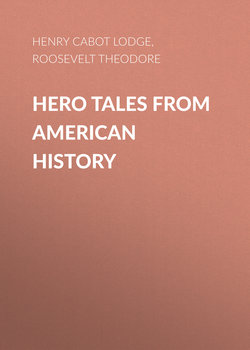Читать книгу Hero Tales from American History - Henry Cabot Lodge - Страница 9
THE STORMING OF STONY POINT
ОглавлениеIn their ragged regimentals
Stood the old Continentals,
Yielding not,
When the grenadiers were lunging,
And like hail fell the plunging
Cannon-shot;
When the files
Of the isles
From the smoky night encampment bore the banner of the rampant Unicorn,
And grummer, grummer, grummer, rolled the roll of the drummer,
Through the morn!
Then with eyes to the front all,
And with guns horizontal,
Stood our sires;
And the balls whistled deadly,
And in streams flashing redly
Blazed the fires;
As the roar
On the shore
Swept the strong battle-breakers o'er the green-sodded acres
Of the plain;
And louder, louder, louder cracked the black gunpowder,
Cracked amain!
—Guy Humphrey McMaster.
One of the heroic figures of the Revolution was Anthony Wayne, Major-General of the Continental line. With the exception of Washington, and perhaps Greene, he was the best general the Americans developed in the contest; and without exception he showed himself to be the hardest fighter produced on either side. He belongs, as regards this latter characteristic, with the men like Winfield Scott, Phil Kearney, Hancock, and Forrest, who reveled in the danger and the actual shock of arms. Indeed, his eager love of battle, and splendid disregard of peril, have made many writers forget his really great qualities as a general. Soldiers are always prompt to recognize the prime virtue of physical courage, and Wayne's followers christened their daring commander "Mad Anthony," in loving allusion to his reckless bravery. It is perfectly true that Wayne had this courage, and that he was a born fighter; otherwise, he never would have been a great commander. A man who lacks the fondness for fighting, the eager desire to punish his adversary, and the willingness to suffer punishment in return, may be a great organizer, like McClellan, but can never become a great general or win great victories. There are, however, plenty of men who, though they possess these fine manly traits, yet lack the head to command an army; but Wayne had not only the heart and the hand but the head likewise. No man could dare as greatly as he did without incurring the risk of an occasional check; but he was an able and bold tactician, a vigilant and cautious leader, well fitted to bear the terrible burden of responsibility which rests upon a commander-in-chief.
Of course, at times he had some rather severe lessons. Quite early in his career, just after the battle of the Brandywine, when he was set to watch the enemy, he was surprised at night by the British general Grey, a redoubtable fighter, who attacked him with the bayonet, killed a number of his men, and forced him to fall back some distance from the field of action. This mortifying experience had no effect whatever on Wayne's courage or self-reliance, but it did give him a valuable lesson in caution. He showed what he had learned by the skill with which, many years later, he conducted the famous campaign in which he overthrew the Northwestern Indians at the Fight of the Fallen Timbers.
Wayne's favorite weapon was the bayonet, and, like Scott he taught his troops, until they were able in the shock of hand-to-hand conflict to overthrow the renowned British infantry, who have always justly prided themselves on their prowess with cold steel. At the battle of Germantown it was Wayne's troops who, falling on with the bayonet, drove the Hessians and the British light infantry, and only retreated under orders when the attack had failed elsewhere. At Monmouth it was Wayne and his Continentals who first checked the British advance by repulsing the bayonet charge of the guards and grenadiers.
